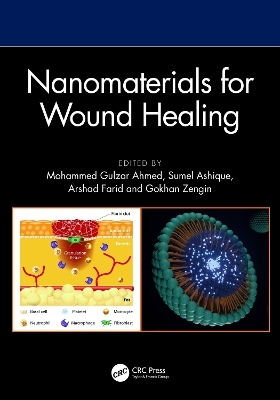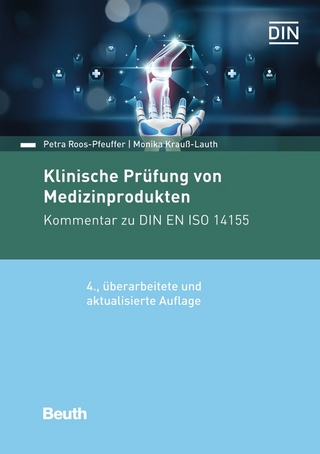
Nanomaterials for Wound Healing
CRC Press (Verlag)
978-1-032-82514-4 (ISBN)
- Noch nicht erschienen (ca. Mai 2025)
- Versandkostenfrei innerhalb Deutschlands
- Auch auf Rechnung
- Verfügbarkeit in der Filiale vor Ort prüfen
- Artikel merken
This book provides a comprehensive examination of wound healing, starting with the foundational knowledge, including the factors affecting it, and the principles guiding wound healing. It delves into the molecular underpinnings of wound healing, particularly in the context of diabetes, and discusses the challenges of chronic wound healing, including the limitations of existing treatments. It explores the current status and future prospects of nanomaterials, including innovative approaches like smart 3D printed hydrogels, drug-loaded nanomaterials, and natural bioactive compounds encapsulated within nanomaterials. The book also introduces bio-inspired nanomaterials and their application in wound dressings and tissue regeneration, emphasizing the diagnostic-to-therapeutic strategy continuum. Further chapters cover the specific roles of nano-biomaterials in diabetic wound healing, skin tissue engineering, and the antibacterial properties of nanomaterials that promote wound healing. It looks into engineered nanomaterials, green synthesized nanomaterials for wound healing and cell growth stimulation, and the advanced application of nanocellulose. The role of the immune system in wound healing and strategies for modulating immune responses to enhance healing processes are explored. Lastly, the book addresses the mechanisms of nanomaterials in wound healing, their recent advancements, limitations, future perspectives, and the importance of conducting toxicity studies on nanomaterials used for wound healing. This book is invaluable source for researchers, clinical practitioners, and students of biomedical engineering, human physiology, and nanotechnology.
Key Features:
Offers a thorough exploration of wound healing processes, starting from basic principles to advanced molecular insights.
Presents the use of nanomaterials in wound healing, including smart 3D printed hydrogels, drug-loaded nanomaterials, and bioactive compounds.
Addresses the challenges associated with chronic wound healing, especially in the context of diabetes.
Introduces bio-inspired nanomaterials and their application in wound dressings and tissue regeneration.
Examines the role of the immune system in wound healing and discusses strategies to modulate immune responses.
Dr. Gokhan Zengin is an alumnus of Selcuk University's Faculty of Science in Turkey, where he also earned his Ph.D. from the Natural and Applied Sciences Institute's Department of Biology. Presently, he holds a professorship at Selcuk University within the same faculty and department. His research focuses on biological activity, chromatographic techniques, and enzyme inhibition. Dr. Zengin has contributed 800 publications to his field of research, amassed over 18,000 citations, and delivered numerous presentations at scientific congresses. Dr. Mohammed Gulzar Ahmed serves as the Principal & Dean at Yenepoya Pharmacy College & Research Centre, part of Yenepoya (deemed to be a university), located in Mangalore, Karnataka, India. With a career that spans over 22 years in teaching and an additional 3 years dedicated to research, he has made significant contributions to the field. His scholarly output includes more than 150 publications in internationally and nationally accredited journals. His expertise encompasses novel drug delivery systems, nanotechnology, targeted drug delivery, and stability studies. Dr. Ahmed has secured 7 patents and has authored 3 book chapters and 4 books. He has also obtained a DST-SERB CRG grant, along with several seed grants from Yenepoya and RGUHS Universities. He has been recognized by the university with awards for Best Researcher, Best Paper, and Good Teacher. Dr. Sumel Ashique currently holds the position of Assistant Professor in the Department of Pharmaceutical Sciences at Bengal College of Pharmaceutical Sciences & Research in Durgapur, West Bengal, India. He brings 3 years of teaching experience to his role. His academic contributions include over 60 publications in both international and national journals of repute. His areas of expertise are in drug delivery, nanotechnology, and targeted treatment strategies. He has been awarded 4 patents from IP Australia and has published 6 book chapters in international books. Additionally, he has published 15 book chapters and edited 5 books with international publishers. Dr. Arshad Farid has been serving as an Assistant Professor at the Gomal Center of Biochemistry and Biotechnology, Gomal University, D.I.Khan, Pakistan, since April 2014. With approximately sixteen years of combined teaching and research experience, he has published more than 90 research articles in journals of international and national repute. His research is markedly interdisciplinary, covering areas such as Medicinal Plants, Natural Product Chemistry, Herbal Drug Development, Ethnopharmacology, Nanotechnology, Drug Delivery, and Microbiology. He has contributed more than 20 book chapters and holds 15 international patents from countries including Germany, the UK, and South Africa. Additionally, he has presented over 15 abstracts at national and international conferences. Dr. Farid actively contributes to the scientific community through peer review of papers for more than 20 respected journals. He was a fellow of the British Council-Charles Wallace Fellowship program at the University of Aberdeen, Scotland, UK, in 2023, and previously received a fellowship in 2007 for training in Environmental, Agricultural, and Analytical Chemistry Laboratory Techniques at the Department of Chemistry, University of Glasgow, Scotland, UK. He is also a Research Fellow at INTI International University, Malaysia, from June 1, 2023, to December 31, 2025.
Chapter 1: Introduction to Wound Healing: Factors affecting, phases of wound healing, principles of wound healing. Chapter 2: Molecular basis of wound healing in diabetes. Chapter 3: Chronic Wound Healing: Existing treatment Approaches and Limitations. Chapter 4: Nanomaterial for wound healing: Current status and future aspects. Chapter 5: Smart 3D printed hydrogel for wound healing. Chapter 6: 3D printed drug loaded nanomaterials for wound healing. Chapter 7: Natural bioactive compound loaded nanomaterials for wound healing. Chapter 8: Bio-inspired Nanomaterials for wound healing. Chapter 9: Wound dressing and tissue regeneration: Role of nanomaterials from diagnosis to treatment strategy. Chapter 10: Nano-biomaterials: Role in diabetic wound healing & skin tissue engineering. Chapter 11: Role of Anti-Bacterial Nanomaterials in Wound Healing
| Erscheint lt. Verlag | 5.5.2025 |
|---|---|
| Zusatzinfo | 18 Tables, black and white; 25 Line drawings, color; 2 Halftones, color; 27 Illustrations, color |
| Verlagsort | London |
| Sprache | englisch |
| Maße | 178 x 254 mm |
| Themenwelt | Medizin / Pharmazie ► Physiotherapie / Ergotherapie ► Orthopädie |
| Technik ► Medizintechnik | |
| Technik ► Umwelttechnik / Biotechnologie | |
| ISBN-10 | 1-032-82514-6 / 1032825146 |
| ISBN-13 | 978-1-032-82514-4 / 9781032825144 |
| Zustand | Neuware |
| Informationen gemäß Produktsicherheitsverordnung (GPSR) | |
| Haben Sie eine Frage zum Produkt? |
aus dem Bereich


